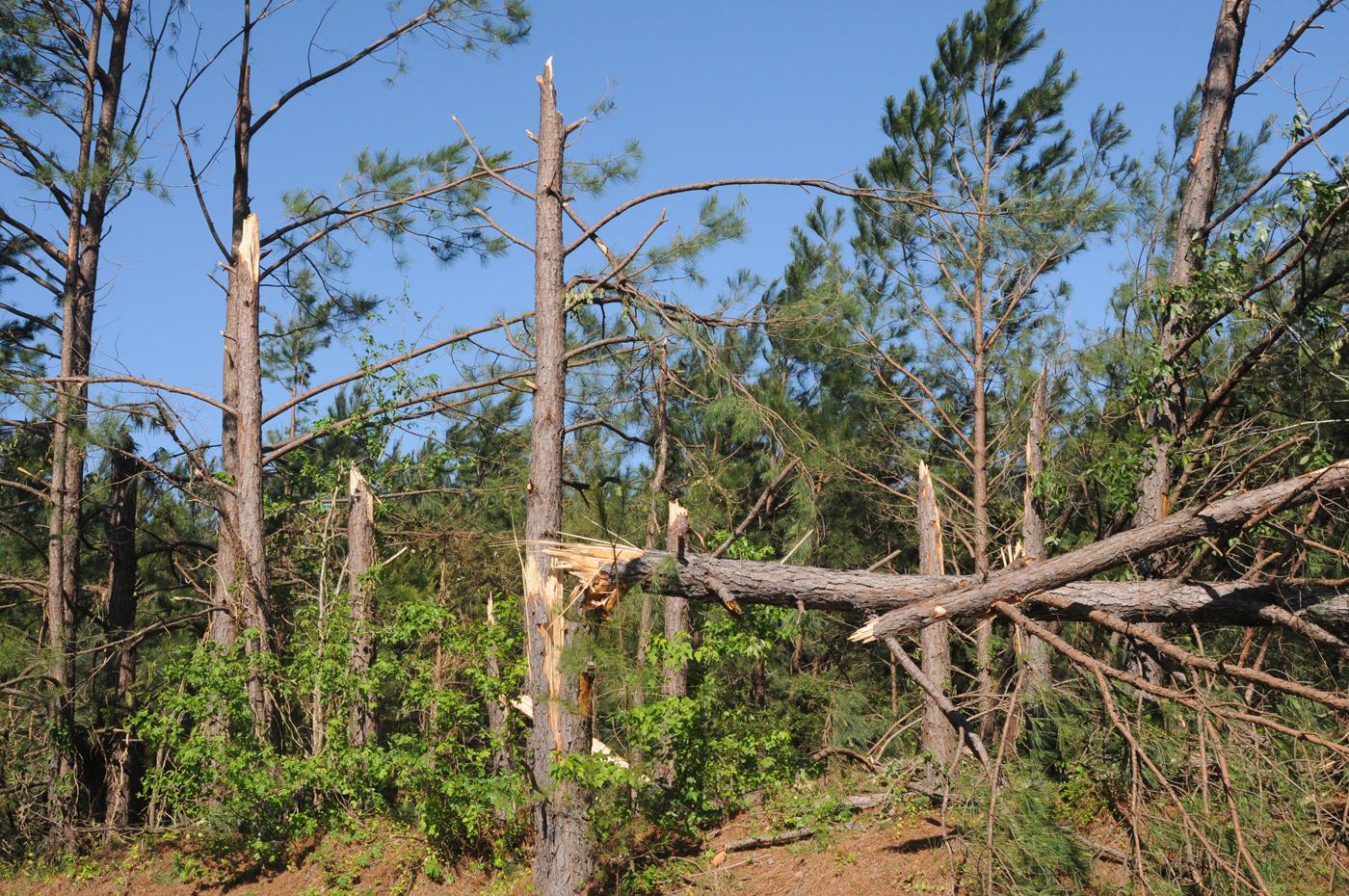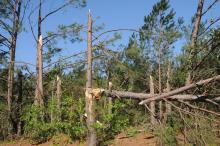Information Possibly Outdated
The information presented on this page was originally released on May 5, 2011. It may not be outdated, but please search our site for more current information. If you plan to quote or reference this information in a publication, please check with the Extension specialist or author before proceeding.
State timber losses estimated at $8.4M
MISSISSIPPI STATE – Tornadoes that swept through Mississippi and much of the southeast April 27 caused an estimated $8.4 million of timber losses.
The Mississippi Forestry Commission compiled the estimate April 30 based on aerial surveys conducted after the storms. Russell Bozeman, director of forest protection and forest information with the commission, said the total affected area was about 26,240 acres. Of this, 15,564 were forested acres.
“Severe tornado path damage was located in 18 different Mississippi counties,” Bozeman said. “The estimate of value losses does not include urban areas, sparsely forested areas or non-forested areas where trees may still have been damaged.”
Bozeman said this estimate is expected to change as more data is collected on the ground.
“These estimates were created by flying the damaged areas and using customized GPS units, called mobile sketchmappers, to map the paths through forestland,” Bozeman said. “We then use tree inventory data from the Mississippi Institute for Forest Inventory and imagery from the Mississippi Automated Resource Information System to get initial volume estimates. An average dollar per ton is then applied to pulpwood and saw timber volume of both pine and hardwood.”
Clay, Lafayette, Clarke, Choctaw and Jasper counties saw the most forest damage. Damages ranged from 2,702 forest acres affected in Clay County to 1,115 acres damaged in Jasper County.
“We typically have this kind of information within 48 hours of the event,” Bozeman said. “Due to the large area affected and the number of different damage paths, it has taken us a little longer to get our initial estimate.”
According to information released online by the Internal Revenue Service, President Obama has declared Chickasaw, Choctaw, Clarke, Greene, Hinds, Jasper, Kemper, Lafayette, Monroe, Neshoba and Webster counties federal disaster areas. Victims of severe storms, tornadoes, straight-line winds and associated flooding beginning April 15 may qualify for IRS tax relief.
“Individuals who reside or have a business in these counties may qualify for tax relief,” their online statement says. “As a result, the IRS is postponing until June 30 certain deadlines for taxpayers who live or have a business in the disaster area.”
The Mississippi State University Extension Service, in conjunction with the Southern Regional Extension Forestry and North Carolina State University Extension Forestry, is hosting two webinars May 18 to help landowners learn how to make insurance claims for timber and shade tree casualty losses.
Debbie Gaddis, MSU Extension forestry timber taxation specialist, said the two webinars will be offered May 18. The session on timber casualty losses will last from noon to 1:30 p.m. and the session on shade tree casualty losses will run from 3 to 4:30 p.m. Both are free and available online.
“Damage and destruction of timber due to weather events, such as the recent storms, is considered a casualty loss. It is also possible to claim a casualty loss for damaged shade trees,” Gaddis said. “Claiming a casualty loss on the federal tax return is not as simple as determining the fair market value of the damaged timber. This webinar will give basic information on how to determine if a loss is deductible and claim these losses.”
Visit http://www.forestrywebinar.net on the day of the webinar, and click on “Upcoming Webinars” to find the session. Participants must download a free software program at least an hour before the program to participate. After that, click on the name of the desired session to join the scheduled program. It is best to sign in 15 minutes before the scheduled time.
The webinars are designed for land managers, land owners, natural resource professionals, tax preparers and anyone else with an interest in this subject. Gaddis will make both presentations.
Contact Gaddis at (662) 325-8002 or dgaddis@cfr.msstate.edu for more information on the webinars.




